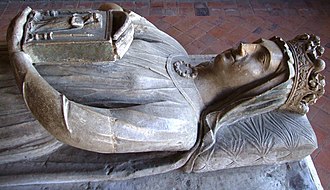It happened today - May 12, 2016

For starters, it’s not an English name. She’s actually from the House of Jiménez and if you associate that name with Spain, given that we’re talking Middle Ages, you’re fairly obviously right. Sort of. Her father was Sancho VI of Navarre and her mother was Sancha of Castile. I guess she’s lucky she wasn’t Sanchita or something even if you don’t find Berengaria especially euphonious.
As for Richard murmuring it amorously, we’re not sure. It was an arranged marriage and not apparently very well arranged. Not much is known about her; even her birth is estimated at between 1165 and 1170. And she is famous, if that’s the right word for somebody so obscure, as “the only English queen never to set foot in the country” though it is not impossible that she did drop by after Richard croaked in 1199.
What? She didn’t visit the kids? Well no. There weren’t any. And if she’d wanted to visit her husband England wouldn’t have been a promising spot since in his 10 years as king Richard spent less than six months there, all of it rapaciously raising money. He was bigger, better looking and a much better fighter than his infamous younger brother John, but not really a better king and certainly not the hero of the Robin Hood stories.
He did take Berengaria with him on the start of the Third Crusade, and if that’s his idea of a honeymoon you can maybe see why the marriage wasn’t a huge success. But it’s also worth noting that Berengaria spent most of her time in Richard’s extensive French possessions, giving generously to the church despite predictable trouble prying her widow’s pension from John’s grasping clutches after 1199.
The upshot of all this, besides John being as bad as they say and Richard being far worse than his reputation, is that national boundaries and allegiances were not the same kinds of things in those days. I don’t just mean not in the same places. I mean really conceptually different.
It’s not odd that Richard would have had a Spanish wife and regarded his title of King of England as just one and possibly not the most important. It would have been odd if it had been otherwise. Richard’s mother, the impressive and more than slightly scary Eleanor of Aquitaine, wife of Henry II of England, wanted the alliance with Navarre to safeguard the southern borders of Aquitaine and improve relations with Castile whose queen was, of all people, Eleanor’s daughter and Richard and John’s sister, “Eleanor of England.” (Meanwhile another sister, Joan, was Queen of Sicily.)
Anyway, Eleanor of A actually had to drag Berengaria to Sicily to marry Richard, because he’d left on the Third Crusade without, possibly, ever seeing the woman he was going to marry. After various adventures Richard and Berengaria got hitched on May 12, 1191 in Cyprus, which Richard had just captured to rescue the shipwrecked Berengaria from its ruler Isaac Comnenus. Berengaria was crowned queen of England that same day by the Archbishop of Bordeaux and the Bishops of Évreux and Bayonne all of which, you might be prompted to point out, aren’t technically in England.
We do not know what happened next, at least in the sense of them doing the sort of thing husbands and wives traditionally do especially on honeymoons. We do know Berengaria left the Holy Land before Richard, who got captured on the way home, was eventually expensively ransomed, and went to England where she didn’t join him.
Richard went back to war, this time against the King of France, prompting Pope Celestine III to tell him to go see his wife and be faithful to her. Richard actually did start taking her to church regularly. And apparently she was very upset when he died, though whether from genuine love or political concern is not clear. She never did get John to pony up most of her pension, but his son Henry III did, and Berengaria gave money to the church, entered a convent and was buried in L'Épau Abbey in Le Mans.
That such a person could have been queen of England without ever going there shows what a cosmopolitan society medieval Europe was. Mind you, the rest of her life tends to suggest that cosmopolitanism ain’t all it’s cracked up to be.